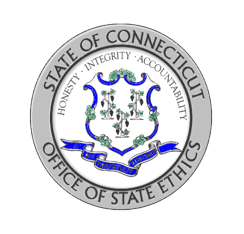Advisory Opinion No. 1994-8
Outside Employment While On
Leave Of Absence
In Advisory Opinion No. 86-8 (48 C.L.J. No. 6, p. 1D (August
5, 1986)), the State Ethics Commission concluded that “a State employee on leave of
absence is considered in state employment.”
Therefore, it is the Code’s limitations on outside employment, not its
post-state employment restrictions, which will apply to the petitioner’s
employment while on leave. Connecticut General Statutes §1-84(b) is designed to prevent
conflicts of interest with state employment by prohibiting the acceptance of
other employment which will either impair a state employee’s independence of
judgment with respect to his or her state duties or which will result in the
disclosure of confidential information acquired in the course of his or her
state service. In addition, under Conn.
Gen. Stat. §1-84(c), a state employee may not use his or her public position or
confidential information acquired as a result of such position to obtain
financial gain for himself or herself or for a business with which he or she is
associated. As a Supervising Nurse Consultant, the petitioner
undoubtedly has access to sensitive, possibly confidential, information. The petitioner may not use such information
to identify a potential employer, nor may she accept employment which would
threaten the confidentiality of such information. In her state position the petitioner is also
undoubtedly called upon to take actions, or make decisions, concerning the long-term
care facilities which the Department regulates.
In general, accepting employment with such a facility would
impermissibly impair the petitioner’s independence of judgment in her state
position, in violation of Conn. Gen. Stat. §1-84(b). Obversely, accepting employment with another
type of entity, such as a school or a hospital, would generally be a
permissible use, for financial gain, of the petitioner’s expertise in the
fields of health care and/or education. If the petitioner should pursue state contracts, she must be
aware, while she continues to be a state employee, that any state contract
valued at $100 or more may only be awarded to her through an open and public
process, pursuant to Conn. Gen. Stat. §1-84(i).
The term “open and public process” as used in §1-84(i) means that there
must a prior public offer and subsequent public disclosure of all proposals
considered and the contract awarded. The
requirements of §1-84(i) would not apply if the petitioner were to be offered a
position as a state employee in lieu of, or in addition to, her position with
the Department of Public Health. Although it is highly unlikely that the petitioner’s outside
employment would involve such activities, it is worth mentioning that Conn.
Gen. Stat. §1-84(d) prohibits a state employee from representing another
person, for compensation, before certain state agencies, and also prohibits the
acceptance of employment with a firm which does so. By order of the Commission, Christopher T. Donohue
Chairperson

